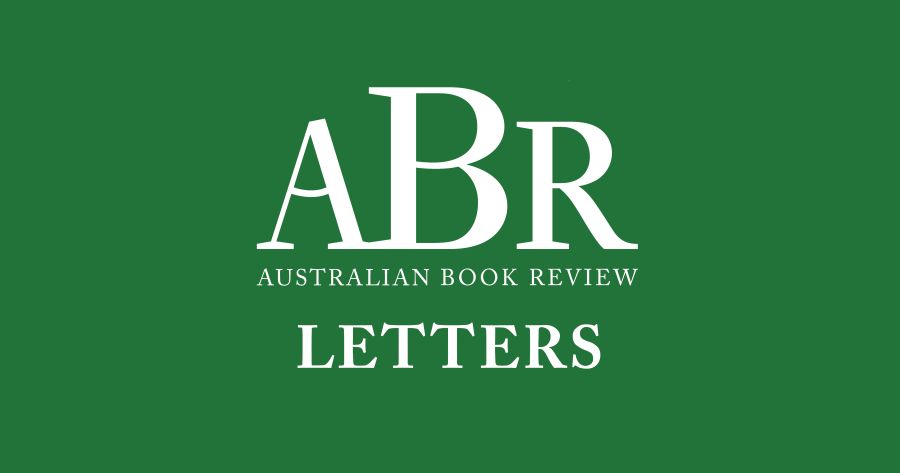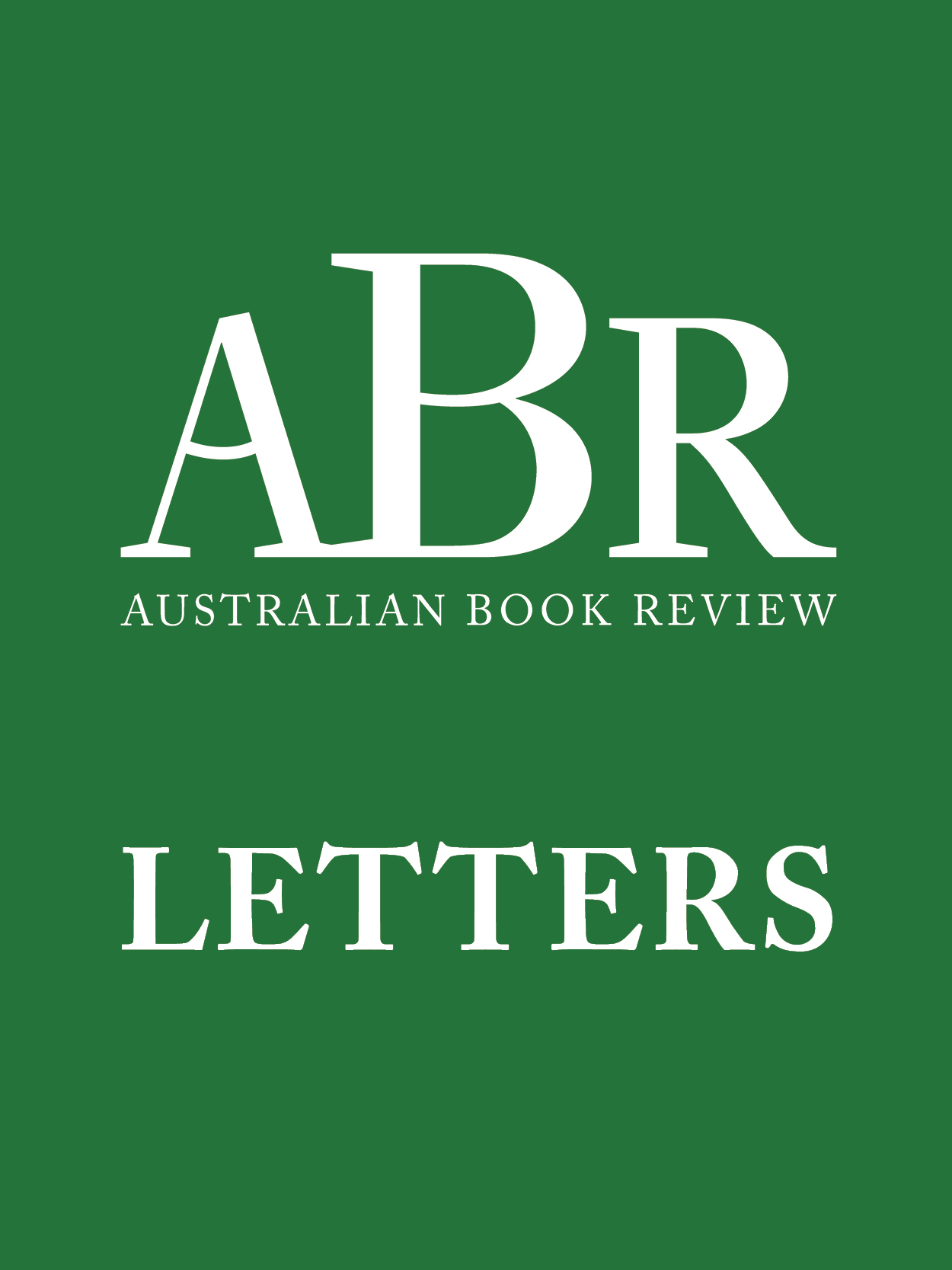
- Free Article: No
- Contents Category: Letters
- Review Article: No
- Article Title: Letters – October 2025
- Online Only: No
- Custom Highlight Text:
My career began at Australian Book Review, and as such I’ve been prompted to reflect on the importance of publications such as ABR to ensuring a robust critical culture in Australia in the wake of Meanjin’s closure. The decision was announced on September 4 that Meanjin, one of Australia’s longest-running literary journals, would cease to be published by its custodian, Melbourne University Publishing, and that the editor and I would be made redundant.
It has been surmised throughout the press and on social media that there were political motivations for this closure, as the sum required to keep us going was paltry in comparison to the university’s vast financial infrastructure. I can’t argue with that. I thank the team at ABR for issuing a statement in support of the journal, in which it was written that literary magazines ‘respond to the moment, but not in a moment’. One can only hope that the work done in these pages, and across the sector, continues to carry Meanjin’s torch – always responding to the moment, at just the right moment.
Eli McLean
The Cringe brought down Meanjin
Meanjin was midwife to our self-worth. In the Summer issue of 1950, Arthur Phillips coined the phrase ‘cultural cringe.’ It described the self-defeating Australian habit of judging ourselves by the standards of England, rather than loving the distinctiveness of what we make, what we have, what we are. The phrase was a diagnosis that allowed Australians to begin redressing a mass inferiority complex.
As bitter as it was provocative, now we can see that Phillips’s analysis was also prophetic. Seventy-five years on, the cultural cringe has returned to bring down Meanjin.
It is obvious that the decision by Melbourne University Publishing to close Meanjin, in its eighty-fifth year, has horrified and angered many of us. It is not obvious why abolishing the journal was the only choice, and why no apparent effort was made to sell it, move it elsewhere, or build up its funds by seeking donations. For an entity of Meanjin’s importance, no problem should have been beyond solving.
Sadly, we may never know for sure why we have lost Meanjin. There will be no accountability to the readership that has lost its contact with our finest new literature, or to the writers who will never have the chance to rise to the ambitions that Meanjin encouraged. The ‘financial grounds’ given as the reason for the journal’s closure are too vague to mean anything to us onlookers. In the past month, much hearsay has circulated, some of it alarming, but there have been few facts.
The lack of satisfactory explanations, though frustrating, is unsurprising. It seems likely that Meanjin is the victim of forms of corporate governance that are unsafe for the media that literature needs. The commercial ventures of major publishers and universities, including the journals they own, are governed by the same laws as any company. Liability for financial failure is personal, so directors may have little choice but to abolish a failure, to remove the risk – and confidentiality rules, to protect people. Yet laws designed to enforce probity in investment banking do not reflect the nature or purpose of a literary journal. There is no amnesty for artistic risk-taking or experiment, without which there is neither intellectual growth nor recovery from disappointment. There is no provision for art for art’s sake or for creating value outside a balance-sheet. There is also no apparent requirement for directors to serve the public good of culture. Under the current laws, any number of journals, or festivals, or galleries, or theatres, may follow where Meanjin has gone and no full reason need ever be given to those who love and believe in it.
Even if the circumstances are a mystery, what we can perceive clearly is the element of surrender in the choice that has been made. The Meanjin decision signals that Australian culture is not held in trust. It is a threatening sign. The Australian cultural cringe is relapsing in places where it will do critical damage. This is a tragedy of mistaken and neglected values. It is a failure of leadership, of imagination and of faith. We should reject the standards that permit this situation and create new ways of guarding against them. And we should raise new institutional leaders who will refrain from even considering shutting down the culture in their care.
If there is any hope to be found in the wake of Meanjin’s death, it is that it may reveal the large and willing readership that the journal had in life – a readership that would have gathered around to save it, if invited. Perhaps that readership will make something new and worthwhile in Meanjin’s place.
Theodore Ell, Honorary Lecturer in Literature, Australian National University
Too tone-deaf for words
‘No doubt one alternative – to present Die Entführung aus dem Serail as Mozart wrote it – would have been too tone-deaf for words.’ (Ben Brooker, ‘Abduction: Neutering, not cancelling, Mozart’s singspiel’, ABR Arts, August 30). On the contrary, I would say that to present it exactly as Mozart wrote it and stage it in order to make visible everything that is problematic about Gottlieb Stephanie’s libretto – that is, by singing it word-for-word as written, or in a fluent but accurate translation – is the only way to present the work in a way that is not tone deaf with regard to its musical and dramatic content.
Humphrey Bower
Ben Brooker replies:
Perhaps Humphrey Bower missed the memo but, for good or ill, we live in a world inhabited by audiences for whom depiction and endorsement have become largely indivisible. Quite apart from that, Bower’s prescription for faithful renderings of canonical works is in practice more often allied with artistic conservatism than historical illumination. No doubt we could do Mozart’s operas in powdered wigs if we wanted to – indeed, The Magic Flute with a black-faced Monostatos – but to what end? The answer, if one exists, surely lies between extremes of fidelity and erasure, and it was by embracing the latter that Abduction’s creative team missed, in my estimation, a valuable opportunity.
The advertising executive is not an everyday person
In regards to Vyshnavee Wijekumar’s review of the Red Stitch production What’s Yours, (ABR Arts, August 6), this sounds like the everyday life lived by some people I have heard of – not as lived by me or people I know. The advertising executive is not an everyday person – whatever her character, she is one of the ‘haves’ in our lives. When people like this can’t get what they want and need, it is not interesting. Most of us don’t live with ‘autonomy’.
Kym Houghton
Vyshnavee Wijekumar replies:
Firstly, thank you for the thoughtful response to my review of Keziah Warner’s What’s Yours. It gave me the opportunity to reflect on my response to the show and question its thematics. You bring up an interesting point: these conversations, dynamics, and experiences are prevalent in my middle-class bubble but may not be ubiquitous or afforded to those in other social circles. Autonomy is a choice available to those with financial privilege. But, when engaging in stories told on stage, screen, or on the page, it’s both an opportunity to connect with people who are relatable, but also to provide a window into lives that are starkly different from our own. What’s interesting in a theatre show is subjective, but what’s more enjoyable is the discussion and debate once the curtains close.
The beginning of the Third World movement
‘“Come nearer to Asia”: Australia’s place at Bandung, 1955’ by Nathan Hollier (ABR, September 2025) is a very important and timely essay. I find Australia’s engagement with this conference fascinating. Also fascinating was the attendance of what seems the only American, the independent journalist Richard Wright who wrote a book The Color Curtain: A report on the Bandung conference (1956), who was perhaps more right on time, rather than ahead of his time, in charting the beginning of the Third World as a movement.
Victoria Grieves Williams
An utterly implausible sauna scene
Regarding Jonathan Ricketson’s review of Our New Gods by Thomas Vowles (ABR, August 2025), seldom have I read a gay book which I found more objectionable on every level: Poorly written, often incoherent, trying over-hard to be clever, extremely defamatory of Melbourne’s gay community. This book doesn’t even deliver what it apparently is setting out to deliver – a page-by-page thriller. For example, the scene in the sauna is utterly implausible, and I should know as over the years I have visited many saunas in many parts of the world, including all of Melbourne’s. This book is simply trashy and I don’t know why serious reviewers would even bother with it.
David Bradford



Comments powered by CComment